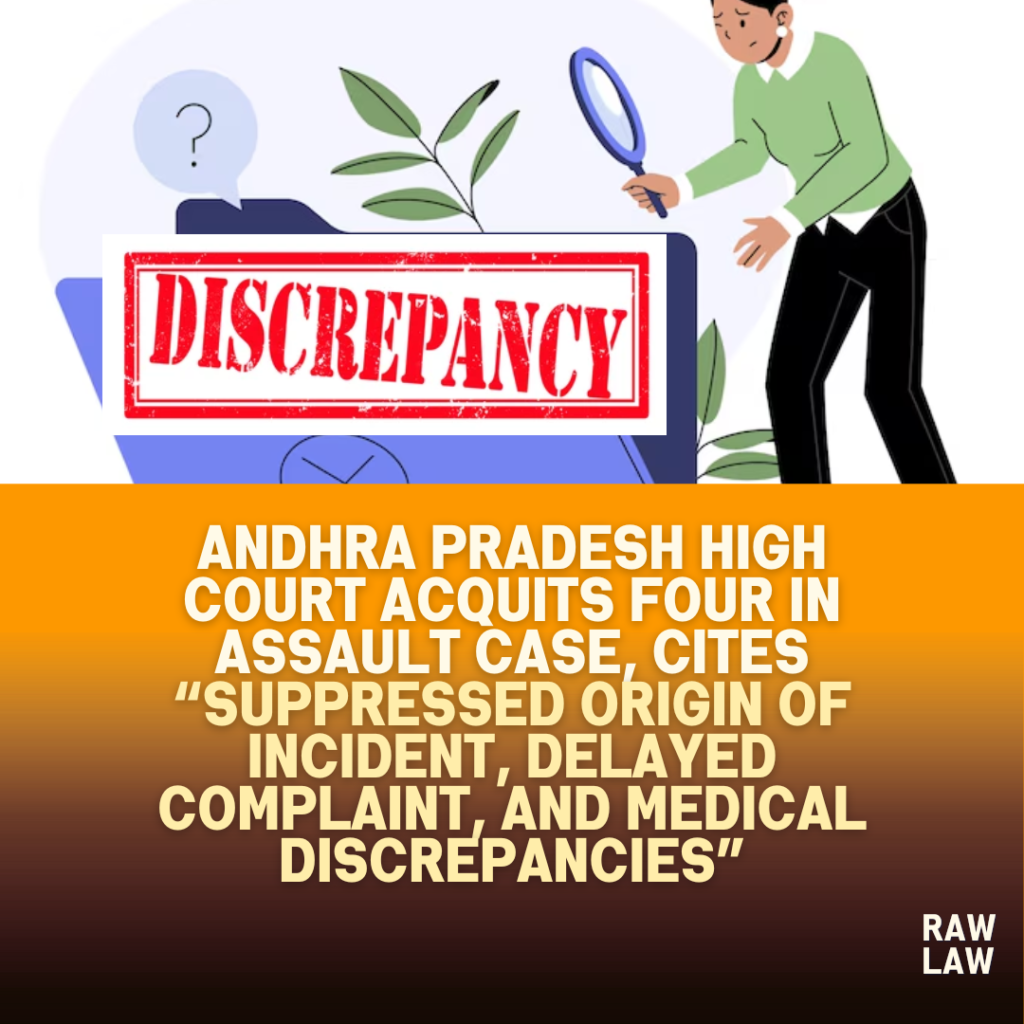Court’s Decision
In Criminal Appeal No. 904 of 2008, the Andhra Pradesh High Court set aside the conviction and sentence of four appellants previously found guilty under Sections 326, 324, and 323 IPC. The Court held that the prosecution failed to prove the case beyond reasonable doubt due to inconsistencies in medical and ocular evidence, unexplained delay in lodging the complaint, and prior enmity between the parties. The appellants were acquitted and directed to be released immediately, with any fines refunded.
Facts
The case stemmed from a private complaint lodged by the injured complainant (P.W.2), alleging a brutal assault on 17.06.2003 at around 7:30 PM. According to the complaint:
- The accused and complainant were engaged in rival centering (construction slab) businesses.
- Enmity developed when the complainant refused to include A.1 to A.3’s names on Christmas decorations he funded himself.
- On the date of the incident, while the complainant was collecting payment, A.1 allegedly hit him on the face, dislodging two teeth; A.2 fractured his leg with an iron rod; A.3 stabbed him in the leg with a knife; and A.7, a police constable, allegedly kicked and verbally abused him.
The complainant further alleged that A.4 to A.6 instigated the assault and promised help. A private complaint was lodged nearly five months later after no action was taken by local police.
Issues
- Whether the prosecution proved the charges under Sections 326, 324, and 323 IPC beyond reasonable doubt?
- Whether the delay of five months in lodging the complaint and the prior enmity between the parties tainted the credibility of the complainant?
- Whether the ocular testimony matched the medical evidence?
Petitioner’s Arguments
The appellants contended:
- The complaint was filed as a counterblast to a criminal case (S.C. No. 262 of 2004) initiated by A.3’s wife under Section 354 IPC, in which the complainant was convicted.
- The complaint was abnormally delayed by five months without satisfactory explanation.
- The complainant suppressed the true genesis of the incident and crafted a story to match later medical findings.
- Medical evidence showed twelve injuries, whereas the complainant’s version only explained three, raising serious doubts.
- All prosecution witnesses were interested and lacked independent corroboration.
- Weapons of offence were never recovered or produced before the Court.
Respondent’s Arguments
The complainant’s counsel argued:
- Delay was justified since the police refused to act, prompting resort to private complaint.
- There were specific and consistent overt acts attributed to each accused.
- The injuries were corroborated by medical records, including a wound certificate and dental report.
- Conviction by the Trial Court was justified on the basis of credible and direct evidence.
Analysis of the Law
The Court examined the inconsistencies between:
- Oral testimony of the complainant (P.W.2) and
- Medical evidence provided by doctors (P.W.1 and P.W.9).
Though 12 injuries were documented shortly after the incident, only 3 were attributed to the accused in testimony. No explanation was provided for the remaining injuries. The complainant admitted to a prior conviction in a criminal case filed by A.3’s wife, arising from an incident that occurred on the same day. The complaint was filed after five months with no copy of the police report sent to higher officials. The Court cited the legal principle that unexplained delay creates suspicion and facilitates embellishment.
Precedent Analysis
The judgment reiterates the settled principle:
“A delayed report not only gets bereft of spontaneity… [but invites] the danger of introduction of coloured version, exaggerated account, or concocted story as a result of deliberations and consultations.”
The Court emphasized that in criminal trials, particularly those involving prior enmity, delay and lack of corroboration demand heightened scrutiny.
Court’s Reasoning
Justice K. Sreenivasa Reddy concluded:
- The unexplained five-month delay was fatal to the case.
- The complainant had failed to explain several documented injuries.
- Medical evidence did not align with the version narrated.
- The prior criminal proceedings between the parties strongly suggested motive for false implication.
- The Trial Court erred by selectively relying on the prosecution evidence while acquitting some accused and convicting others based on the same record.
The High Court thus found the case unfit for conviction and held that the appellants were entitled to the benefit of doubt.
Conclusion
The High Court allowed the appeal, holding:
- The conviction of A.1 to A.3 under Sections 326, 324 IPC and of A.7 under Section 323 IPC was unsustainable.
- All appellants were acquitted of the charges and set at liberty.
- Any fines paid were to be refunded.
Implications
This decision reinforces the principles of criminal jurisprudence:
- Delay in complaint without cogent explanation weakens prosecution.
- Conviction cannot be sustained on tainted or selective evidence.
- Prior enmity and parallel criminal cases between parties necessitate rigorous scrutiny.
- It sets a precedent on the dangers of delayed private complaints motivated by prior disputes.
